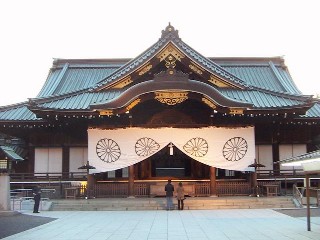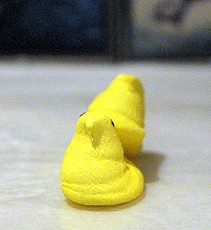Yasukuni shrine and Princess Mononoke

It is still controversial that Prime Minister Junichiro Koizumi keeps visiting Yasukuni Shrine. It's obvious that it draws protests from China and South Korea, but the purpose of his stubbornness is not understandable. You may wonder there's something more, so let me discuss two points from now.
1. What makes people support him? newspapers or TV? Neither do they!
Knowing his visit in Oct. 2005, Japanese mass media took it up as a big headline, broadcasted it as a live news, interrupting normal TV programs. On the contrary to your guess, Japan's mass media are VERY concerned that Koizumi visited the shrine.
Looks like almost all of the TVs and newspapers are the one who attempt to undermine Koizumi, except Sankei group. Most of the mass media are supported by companies venturing into China, and we have too many pacifists and Marxists in mass media. Obviously they don't like having a conflict with China.
It's a typical tug-of-war between Japanese press and silent majority.
2. The historical positioning of shrines
A friend of mine at work told me that major Chinese newspapers write the shrine as a war shrine and it worships the war criminals. I wasn't surprised that Chinese media is not mature as well as Japan's, being one-sided tone. I want to trace the historical positioning of shrines and try to explain why they honor the war criminals.

Did you ever watch "Princess Mononoke"? It is one of famous Japanese animes, and you can rent it every video rental shops. The reason I bring it up is you can see the mentality of Japanese people in that movie and it can be strongly related to the Yasukuni Shrine. For those who don't know the gist, I'll briefly follow it here. It's from a very old time when people lived along the nature, Princess Mononoke vowed revenge against human being for the destruction of the nature. At the beginning, a big boar became demoniac and assaulted a village for his injury by guns. The village people killed the boar, and one suggested that they commemorate the boar.
This is what I want to focus on; the way of the typical Japanese is that they can't help commemorate someone who died with anger or sorrow. This is simply because they fear the curse from the dead spirit on the live people. Dazaifu Tenmangu in Fukuoka is one of the typical shrines that were build for such a reason. So was Goryo Shrine near my hometown in Kyoto. I've heard a prince was killed for a power game in ~10th century. Not that he was a great person because he was dead in his youth. It's just because he must be resentful at this world and died. They are so many shrines in Japan, but the more the resentful the honored person is, the longer the shrine tend to survive. People say that they possess more magic power so they need longer time to be calm down in the shrine. I think it's just people believe so.
Let's get back to Yasukuni Shrine. The logic of what people thought was the same. Not only the war criminals, but many dead soldiers are commemorated in Yasukuni because as you know by now, people fear the revival of the dead as a demon. So we can now easily guess what the mundane people think. They vow revenge against China? NO!
I attached simple F.A.Q. in the following.

Q. Why can no one stop him going there ?
A. It's his belief, and his freedom of religeon must be guaranteed.
Q. Why does the shrine commemorate war guilts ? They must attempt to whitewash their crime.
A. Look at the Japanese culture of building shrines. Many shrines commemorate those who died in a poor way. People believe from very old time that death souls in anguish turn to daemon to curse people and the world. Yasukuni shrine commemorates "war guilts" not to turn them to daemons.
Q. Why does Koizumi go to the shrine ? He pledges to avenge a defeat.
A. Yasukuni shrine commemorates many deaths. For instance, a deplomat killed in Iraq is in Yasukuni. His body should be visited by Koizumi because he died while Koizumi was the Prime Minister.
Q. Then why doesn't Yasukuni separate the "war crime" from normal deaths ?
A. It's what Yasukuni shrine can decide, not citizens or Koizumi can do.
Q. Does yellowpeep support his visit ?
A. If I was a Chinese, I don't support it. That way, I can sneak into East China Sea and suck the gas up while grabbing other countries attention. Plus at least Korean remains a loyal. If I was a Japanese PM, I can maintain a high approval rate by just going to Yasukuni, and able to do a drastic reformation as Koizumi did. So I support his visit. If I was from some place else, really don't care.


7 Comments:
I think a head of state had every right, and arguably even an obligation, to pay his respects to those killed in war. Regardless of whether or not that war was "right"; they died fighting for the country. And there are far more people enshrined there than the war criminals. Koizumi has said repeatedly that he goes there and prays for an end to war; not for revenge. Finally, let me say that I'm pretty sure the Chinese have a similar idea about respecting the dead to that of the Japanese - and somehow they cannot seem to understand why the spirits of the dead need to be enshrined and respected.
I become anxious with whether people deified by Yasukuni begin to get angry.
Although the tone of argument which criticizes Syu-yu-kan is also seen recently, it has helped explanation of some men deified by Yasukuni.
It is the same as denying people deified by Yasukuni to deny worship.
Probably they look at the state of present Japan, are getting angry, and are feeling sad.
ところで、最後のQ&Aが機械翻訳では意味不明でした。T-T
As you do, I think Chinese have similar sympathy and respectful mind for every dead people. I hope so.
I've heard a little about Syu-Yu-Kan. I'll go back to Japan some time and visit there. It used to be far from a famous shrine, though. It's funny that China enhanced its value. By criticizing the shrine, Yasukuni gets more donation from eager supporters.
Q. yellowpeepは彼の参拝を支持しますか?
A.もし私が中国人なら参拝しません。そうすれば人の目をひきつけながら東シナ海で思うようにガス田を開発することができる。それに韓国は少なくとも家来になってくれる。
もし私が日本人の総理なら、参拝する。そして高い支持率をキープしながら、小泉の国内の改革を進めるだろう。(ゆえに支持。)
もし第三国の出身なら、全く気にしない。
という内容で書いたつもりです。
Thank you, it is about the Japanese translation,Yellowpeep .
Surely the visitors of a Yasukuni shrine increased in number for the anti-Japan action of China or South Korea.
My religion is Shintoism.
I have not been to Yasukuni.
But,I expect that Shintoism upon which it did not look back until now may be improved.
I'm an American and I support Koizumi's visit to the shrine. Because Shintoism isn't such a different religion and belief system from the American tradition.
We believe in the Founding Fathers and venerate them as you would those who have died protecting Japan, and for the same reasons.
Many Americans in the armed forces have unit traditions, they study and learn about the sacrifices of those who have gone before, fought in WWII, in the same military units that they were in. And they respect those who have gone before, because they respect the sacrifice of Americans who have given their all for the mutual defense of the nation that we are all defending.
Here are just a few letters written by American service men and women.
There are many more at Black Five and Mudville Gazette.
As I understand it, Japanese children are taught that they owe a debt to their family, the Emperor, and those who have fought so that children of the next generation would be safe.
This debt requires them to "give something back" in repayment, a point of honor and of loyalty.
In the United States, many people feel gratitude for our military and for the sacrifices of the previous generations. Therefore we also feel a debt must be paid, that is why many join the military, to repay the debt, to clear the way for the next generation.
Yasu, if I recall right, is the symbol for peace. And peace is the thing all American patriots fight and die for.
The difference in America is that we call this code of honor "patriotism" while you call it Shintoism, a religion. Because ours is not a religion, we cannot express it as well, but it also means the government can back it to the hilt and promote it. In Japan, it seems Japan cannot promote Shintoism because it is a religion. Yet you benefit from Shintoism's spirituality and definitions, that most Americans find very hard to communicate using.
Much of what I learnt from Shintoism I learned from here.
Many Americans, if they knew about Yasukuni, Emperor Hirohito's actions, and Shintoism in Japan would feel very comfortable and understanding.
They may not be able to describe just why they would feel so, but that is because patriotism is not a religion in the United States, it is not studied and put to print.
Although the visitors to my site are not many, I'm glad to have sincere visitors.
Yes, "yasu" is a symbol for peace. Therefore, "yasukuni" means "peaceful nation".
No objection about your opinion. Let me make one comment about the "debt" you refer to. If I try to teach pupils based on your understanding, the debt to Emperor,that would be a dispute due to violation of freedom of religion because the concept of oweing debt to Emperors is already a religion. Thus most of the teachers in Japan are careful about mentioning it. I think it should be smooth since Emperor is just a symbol such as their flag. Note that there even exist an objection about talking about "rising sun" in Japan. Let alone Emperors.
It is possible to discuss patriotism like America without bringing Shintonism. This is still a taboo, however, because "patriots" lead Japan to defeat 60 years ago. The biggest difference betweeen America and Japan I found is the fact that America won because of their patriotism while Japan was defeated otherwise because of the same kind of patriotism.
Just think about how many Cindy Sheehans exist in Japan.
Post a Comment
Subscribe to Post Comments [Atom]
<< Home